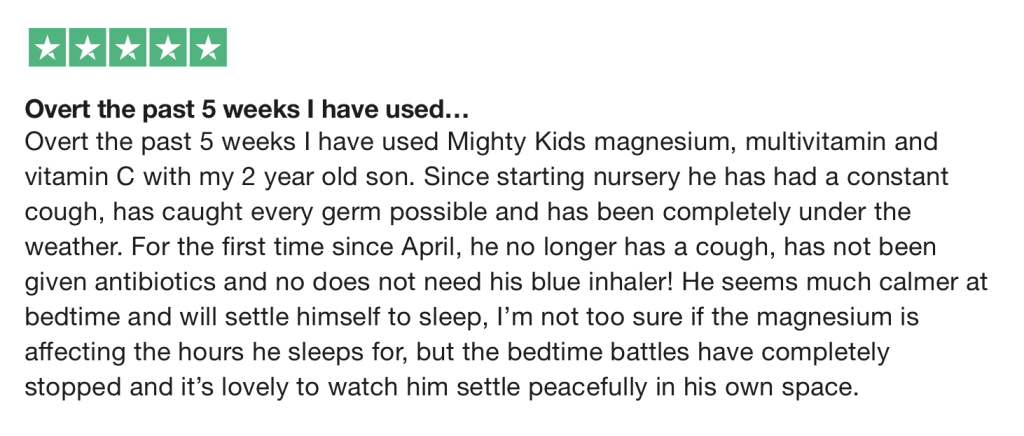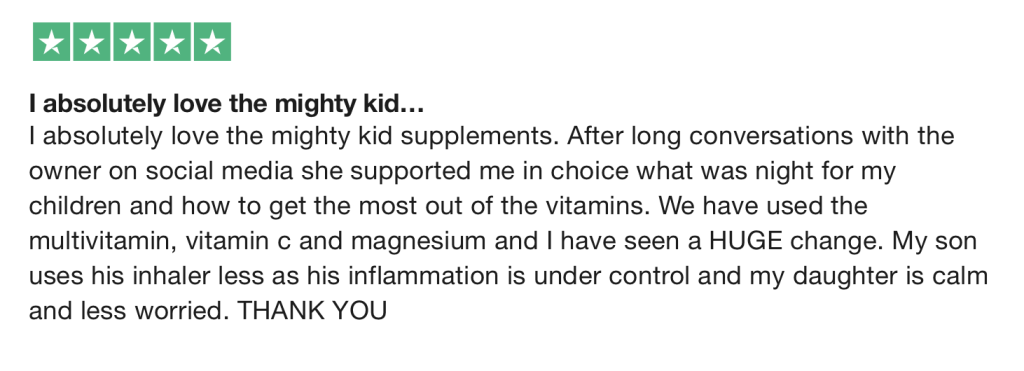There are two well known nutrients that can really support the symptoms and severity of asthma and other inflammatory conditions in children: Vitamin C and Vitamin D. There are also studies showing the link between sufficient Magnesium levels and healthy pulmonary (lung) function. Because Magnesium plays a large role in proper Vitamin D absorption, it makes sense to ensure these levels are also optimal when dealing with inflammatory conditions.
Since launching Mighty Kids, we have received numerous testimonials from parents who have seen these very things improve their child’s asthma, even reducing or removing the need for inhalers.
Please note: we do not provide any medical advice and we would never suggest that you stop the use of a prescribed medication or medical device without speaking to your health care team! This is simply information to help shed light on another element of many health situations, which is the nutrition aspect. We hope it encourages further personal research and curiosity.
VITAMIN D
There are several studies showing that patients presenting with asthma have lower Vitamin D levels. Here are some extracts from various sources linked below:
Vitamin D deficiency is prevalent in asthmatic patients. Moreover higher asthma severity, poor asthma control, and frequent exacerbations in asthmatic patients are associated with lower levels of vitamin D and magnesium. Serum 25(OH)D and magnesium levels may serve as markers of asthma severity. So levels of these analytes should be monitored in asthmatic patients and should be corrected if found low.
In 10, 933 participants, Vitamin D supplementation reduced the risk of acute respiratory tract infection among all participants. Conclusions: Vitamin D supplementation was safe and it protected against acute respiratory tract infection overall.
Some studies have shown that vitamin D treatment reduces asthma exacerbations by 30% in patients with mild to moderate asthma and low vitamin D levels. A growing body of research on epidemiologic associations between vitamin D deficiency and poor asthma control supports the therapeutic efficacy of vitamin D in the treatment of asthma. Exacerbations, also known as periods of sudden worsening of symptoms, are a leading cause of death in asthma and are often caused by viral infections of the upper respiratory tract.
VITAMIN C
Another great support is Vitamin C and we have several customers using our Mighty Kids Liposomal Vitamin C to help manage seasonal congestion, coughs, and asthma, with amazing results.
If your child is struggling with asthma, then adding this in to your protocol may provide additional benefits, alongside Magnesium and Vitamin D3/K2.
Vitamin C plays a crucial role as an antioxidant and because asthma causes considerable oxidative stress, this vitamin is often needed in higher amounts to combat this.
The level of vitamin C in the lungs is high, and vitamin C levels in alveolar macrophages and alveolar type II cells are 30 times higher than in plasma. Alveolar macrophages are the first line of defense against invading respiratory pathogens.
To simplify: these are the white blood cells found in the lungs! And they contain 30 times more Vitamin C than our plasma levels- this must be an important place for Vitamin C to go!
Mast cells play a critical role in the pathogenesis of allergic asthma. Histamine is a central mediator released from mast cells through allergic reactions. Histamine plays a role in airway obstruction via smooth muscle contraction, bronchial secretion, and airway mucosal edema. Trials conducted on humans found that the administration of vitamin C significantly decreased plasma histamine levels.
To simplify: asthma increases histamine release from mast cells. This oxidises Vitamin C, which would deplete it. Vitamin C decreases histamine levels in the blood. This can have a positive effect on the muscle contractions, secretions and oxidation in the lungs. So more Vitamin C = less histamine release and less inflammation in the lungs.
A single oral dose of vitamin C can rapidly elevate mucosal vitamin C levels. Nasal lavage fluid vitamin C levels in human subjects increased by three-fold in two hours after a single dose of 1 or 2 g of vitamin C. The rapid transport of ingested vitamin C to the respiratory tract lining fluid implies that even single doses of vitamin C might be effective in protecting against acute increases in oxidative stress in the airways.
Other studies examined subjects who were under short-term, heavy physical stress and revealed that vitamin C reduced the incidence of respiratory symptoms by 52% (95% CI: 36% to 65%). Another trial reported that vitamin C halved the duration of the respiratory symptoms in male adolescent competitive swimmers.
MAGNESIUM
Vitamin D requires adequate Magnesium to be absorbed and properly distributed in the body. So any time there is a need for increased Vitamin D, it is important to ensure there is sufficient Magnesium to support it. It also has its own benefits in the treatment and management of Asthma.
…new investigations into the pathogenesis of the disease are emerging. For example, many reports have observed that low blood levels and low dietary intake of magnesium are factors that possibly contribute to the development of asthma”. In addition, low levels of magnesium have been detected in asthmatics compared with non-asthmatics, especially those that have presented to the emergency department with exacerbations.
The possibility exists that magnesium deficiency contributes to pulmonary complications
Supplementing these nutrients may also be a great support for other inflammatory conditions such as eczema and inflammatory bowel diseases including Chron’s disease, which are often linked to higher chances of having asthma.
We recommend using Mighty Kids Vitamin D3 with K2, Vitamin C and Magnesium for the best in absorption and quality. Shop our liposomal supplements here.
Please check with your health care provider for appropriate dosage beyond that listed on the bottle, based on your child’s age.
Oftentimes a higher dose Vitamin D is prescribed for children with asthma for either a short or long term period.
The National Institutes of Health (research partner of the NHS) sets out the recommendations for daily intake of vitamins and minerals. There is a chart for recommended dietary allowance, and a chart for tolerable upper limits. Use these as a guide, alongside advice from your health care team, to determine the amounts that you may need to supplement daily and during exacerbations.
https://ods.od.nih.gov/factsheets/VitaminD-HealthProfessional
https://ods.od.nih.gov/factsheets/VitaminC-HealthProfessional
https://ods.od.nih.gov/factsheets/Magnesium-HealthProfessional
Here are some incredible reviews from Mighty Kids customers who have seen the benefits and support of using our liposomal supplements in the management of asthma and other respiratory issues:




SOURCES:
https://pubmed.ncbi.nlm.nih.gov/8509592
https://www.ncbi.nlm.nih.gov/pmc/articles/PMC8838086
https://www.ncbi.nlm.nih.gov/pmc/articles/PMC10425698
https://www.ncbi.nlm.nih.gov/pmc/articles/PMC8672460
https://www.ncbi.nlm.nih.gov/pmc/articles/PMC6155154
https://www.ncbi.nlm.nih.gov/books/NBK513313
https://www.ncbi.nlm.nih.gov/pmc/articles/PMC9543098
https://www.ncbi.nlm.nih.gov/pmc/articles/PMC6379356
https://www.ncbi.nlm.nih.gov/pmc/articles/PMC5080508








